(PERU)
Los Ángeles Press [Ciudad de México, Mexico]
September 30, 2024
By Rodolfo Soriano-Núñez
Giuliana Caccia and Sebastián Blanco pretended to be victims to derail Pope Francis’s probe on abuse and violence at the Peruvian Sodalitium.
In Belgium, Pope Francis calls to bring evil to light. “Let it be known and whether layperson, priest, or bishop: let the abuser be judged.”
In Lima, archbishop Carlos Castillo cited Pope Francis’s call in Belgium and called for a “a deep process of renovation in the Church. We need to raise our voice, honestly, without subterfuges or lies.”
Less than one week after Pope Francis’s decision to expel a total of eleven leaders from the Sodalitium, news of the Pope issuing a decree of excommunication against two far-right activists broke on Sunday.
The Sodalitium, a Roman Catholic order marred by abuse accusations since the late early years of this century, found their “champion” in a couple of far-right activists pretending to be victims of clergy sexual abuse to derail the Vatican probe.
This episode, and a review of who are some of the eleven leaders of the Sodalitium Pope Francis expelled help to better understand abuse and violence in religious organizations.
Some of the leaders forced out blame their youth, their inexperience, their thirst to provide some form of service to their Church, heavily charged with the toxic fumes of political confrontation.
It is impossible to go here over the details of the original and the current political theologies of the Sodalitium. Suffice to say at this point that they embraced the idea that in going after their enemies there was no limit to the use of violence and that their own members had to become the mythical figure they talk about: the half monk, half soldier.
In Peru, from the 1960s and up until the 1990s political violence shook the country to the core. If you ever have a chance to watch The Dancer Upstairs, John Malkovich’s forgotten masterpiece as director, do it.
Malkovich offers a sober depiction of political violence during the last year or so of terrorist activities of a character based on Abimael Guzmán, the leader of Shining Path, one of the most violent guerrilla organizations in Latin America.
Half monk, half soldier
It was within that context of extreme political violence that the Sodalitium went from a mostly religious organization to a politico-religious entity aimed at building something similar to both the Spanish Falange, on the political side of issues, and something similar to the Spanish Opus Dei make the Second Vatican council. Again, the ideal of the half monk, half soldier.
The thirst for violence shaping the Sodalitium knows no limit, and with it their disdain for any ethical consideration as the most recent development on this case proves.
Yesterday, around noon news emerged that, on September 25th, Pope Francis, at the same time we knew about the Pope’s decision to expel ten leaders of the Sodalitium before his pastoral trip to Belgium and Luxembourg, signed a more reserved document.
The document, sent to his representative in Lima, Italian archbishop Paolo Rocco Gualtieri, with the instruction of delivering to two more leading members of that organization that have been dismissing any denunciation of abuse at the Sodalitium, while attacking journalists, the victims themselves, and even the priests and bishops willing to at least admit that something wrong happened at that organization.
Nuncio Gualtieri had instructions to reach Giuliana Caccia Arana and Sebastián Blanco Eguiluz to give them a document from Pope Francis. The message is a decree of excommunication that Caccia Arana and Blanco Eguiluz could have avoided by keeping quiet and accepting that they lied to try to derail the ongoing probe on the Sodalitium.
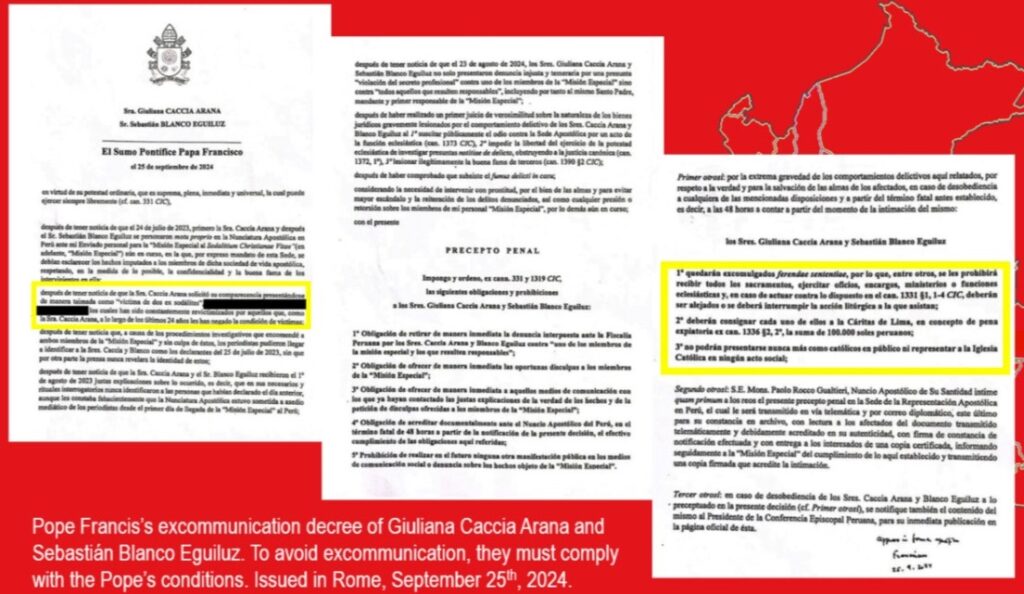
Caccia Arana and Blanco Eguiluz pretended to be victims at the Sodalitium as a contraption to discredit almost three decades of accusations and battles in civil and religious tribunals against that Roman Catholic religious “order”.
Caccia Arana is a frequent guest in the Peruvian far-right media ecosystem. She is one of the most vocal supporters of the Sodalitium. She would be perfect to play the Peruvian version of the recent Trad-Wives trend in the United States.
She has a Spanish-speaking blog at EWTN where she recycles the standards of the political far-right in Peru and Latin America, with frequent attacks on the United Nations 2030 Agenda on Development (see this video, audio only in Spanish), along the lines of what the President of Argentina, Javier Milei, went to yell at the General Assembly of the multinational body.
Despite the reserved nature of the communication sent through Gualtieri and the potential consequences of their actions, Caccia Arana and Blanco Eguiluz went public with the excommunication issued by Pope Francis in a video (available here, audio only in Spanish) where, once again, they render themselves as victims of some conspiracy within the Roman Catholic Church aimed at destroying the Sodalitium and ultimately the Church itself.
José Enrique Escardó Steck, a survivor of abuse at that organization, the first person ever to go public with a denunciation of what was happening at the Sodalitium, back in 2000 published the document on Sunday around noon in what used to be Twitter.
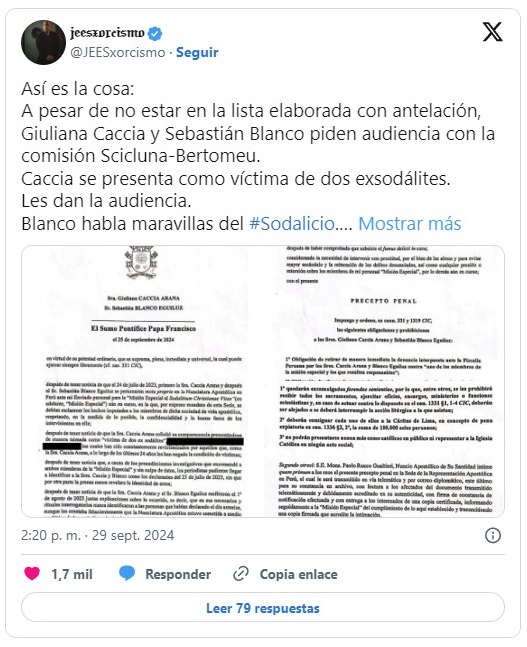
Escardó Steck is the frequent target of attacks from the now expelled leaders of the Sodalitium, and their allies in Peruvian, U.S., Mexican, and Spaniard far-right media. The Catholic far-right throws the sink at him for having brought light to what was happening at the order he joined at some point in his life.
As other victims of clergy sexual abuse, he criticizes frequently the leaders of the Roman Catholic Church in Peru, Latin America, and Rome.
These days, however, he found an ally in Pope Francis who uncovers in his decree the game played by the most radical factions of the Sodalitium and other religious orders unwilling to accept that abuse happens.
The key
The key to understand Francis reaction on this issue lies in the third paragraph of the decree, the Pope states that “in a deceitful manner” (“de manera taimada”) both Caccia Arana and Blanco Eguiluz tried to render themselves as victims of abuse at the Sodalitium, as to prove that there was never any abuse at that order and that the commission is a plot to attack their movement.
Both filed a complaint at the Nation’s Attorney Office seeking to discredit the Church’s internal probe carried for the last year or so by Charles J. Scicluna, Jordi Bertomeu, and the Apostolic Nuncio to Peru, Gualtieri. Pope Francis describes the complaint at the Peruvian national authority as “unfair and reckless” stressing how it includes him.
What is even worse. Caccia Arana and Blanco Eguiluz tried to fool Scicluna, Bertomeu and Gualtieri by pretending they were victims of Escardó Steck and Martin Scheuch, who are themselves victims of abuse at the Sodalitium and who are active in social media and media at large telling their own stories.
Pope Francis sets a fatal term that will end by midday today to retract the complaint at the Nation’s Attorney office; Pope Francis calls Caccia Arana and Blanco Eguiluz to cease to question the nature of the commission set to probe the abuse at the Sodalitium.
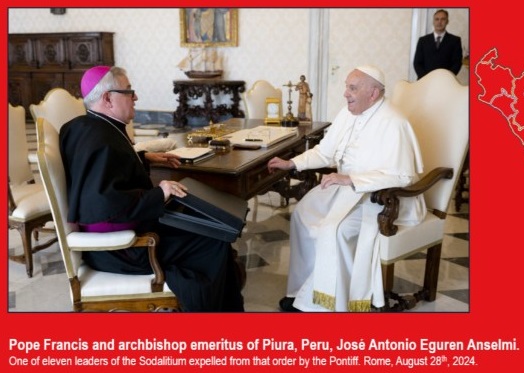
They must offer apologies to the members of the commission headed by archbishop Scicluna. If they dismiss the conditions, they will incur, automatically in excommunication. They will excommunicate themselves.
In that scenario, they will be unable to access any sacrament. They will have to pay each of them a fine of 27 thousand USD to the Peruvian Catholic Relief Agency, locally known as Caritas. Also, they will not be able to call themselves Roman Catholics in public activities nor they will be able to function as representatives of the Roman Catholic Church.
Both Caccia Arana and Blanco Eguiluz mocked the Pope’s decree with the video cited before and other postings in social media, so it is clear that they will try to render themselves as martyrs of a tyrannical Pope.
They have been portraying the Pope as such when it is clear that Rome is not precisely diligent when dealing with accusations of clergy sexual abuse. Quite the opposite.
Scicluna made a name for himself for delaying justice and rubberstamping absurd accounts of the reasons behind clergy sexual abuse in the Legion of Christ in Mexico or in the Pious Priestly Union in Santiago de Chile, to name two of the most notorious failures of the archbishop of Malta.
Caccia Arana’s and Blanco Eguiluz’s attitude on the issue is a good example of how on top of the many hurdles that victims must face to obtain a measure of justice in civil or canonical courts, there is also the issue of how there are elements in the Roman Catholic Church so blind to admit the very possibility that abuse happens that will claim that the Pope himself is setting up a commission to destroy for some unknown reason an order with a long record of abuse, sexual and otherwise.
It is hard to forecast the outcome of the conflict. These days it is impossible to assume that the bishops of the Catholic Church will support Pope Francis, while it is possible to assume that Caccia Arana and Blanco Eguiluz, will find support in the most radical right-wing “influencers” in the Spanish-, English-, and Portuguese-speaking worlds.
In the archdiocese of Denver, where at least three of the eleven leaders expelled have some form of residence, archbishop Samuel J. Aquila was less than enthusiastic to express support for the Pope.
He issued a statement that appears below as an image. There Aquila sides with Daniel Alfonso Cardó Soria, praising him, emphasizing that he has been in Colorado for 17 years now, claiming that he has not faced any disciplinary action during that period.
Cardó Soria still appears as the pastor of the Holy Name parish in the parish’s website (available here). Right there, one can find a link to the so-called Christian Life Movement, one of the many tags used by the Sodalitium in the English-speaking world.
When talking about Alejandro Bermúdez Rossel and former Superior General of the Sodalitium Eduardo Antonio Regal Villa, Aquila says they “have served faithfully and with distinction in the archdiocese of Denver and the findings against them are deeply disappointing, to say the least.”
Disappointing, but no word of caution or any other measure. It is not clear whether archbishop Aquila was talking about Bermúdez Rossel’s as a former employee of EWTN or if, on top of the titles he used to hold at that medium he had some other duties at the diocesan level in Denver.
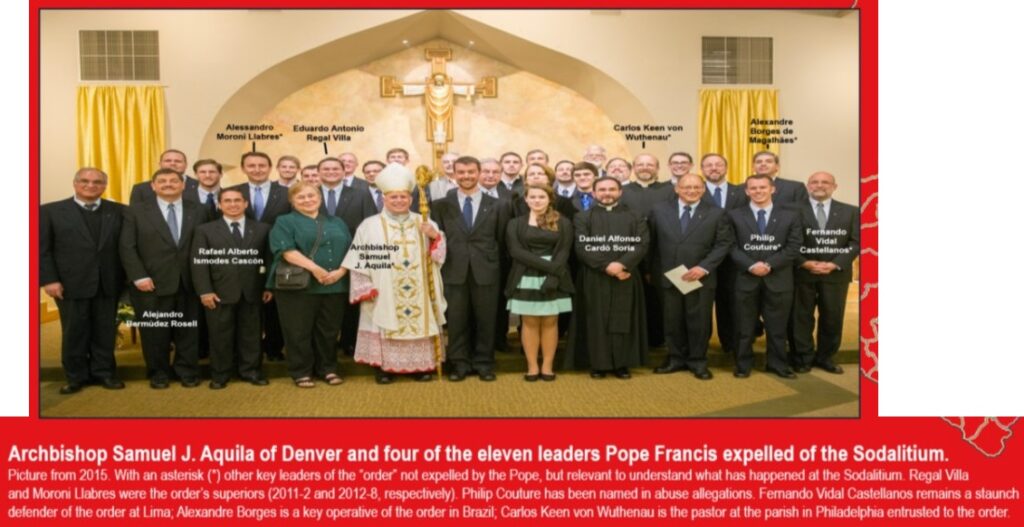
In any case, even if the eleven expelled males were all members of the Sodalitium, they were not the average member in a Roman Catholic organization. They were in charge at the Sodalitium, an organization with a longstanding tradition of using violence to quash any opposition.
In that regard it is not clear if they will join Caccia Arana and Blanco Eguiluz in their search for a sword to fall in or if they will finally acknowledge what their order acknowledged, as an example, back in 2017 when then Superior General Alessandro Moroni Llabré, who remains a member of the Sodalitium, offered 2.8 million US dollars as a measure of compensation to a group of 66 survivors, as the image below proves.
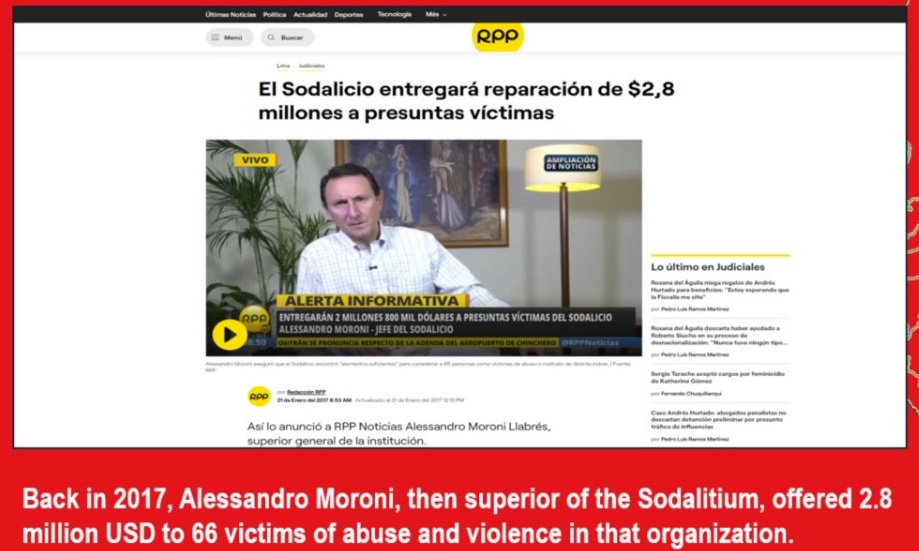
One key issue with that Commission is that it tried to portray the abuse at the Sodalitium as the byproduct of a criminal mastermind able to do whatever evils he did on his own.
In all of those and many other cases, when evidence is overwhelming, bishops and/or superiors, claim the lone predator as a “jail-free card” to avoid deeper probes that could reveal the real extent of abuse at religious organizations.
Richard Sipe, an authority on clergy sexual abuse, coined the notion of “scarlet bond” as to provide a meaningful explanation of how abuse happens in a diocese or an order.
Bishops from Mexico, with Marcial Maciel, all the way down to Argentina, with Carlos Miguel Buela or the Próvolo Institute or Chile with Fernando Karadima or Renato Poblete, have tried repeatedly to convince their grieving faithful that if abuse happens is because there are these predators who act on their own without knowledge from the bishops or other superiors in the dioceses or orders.
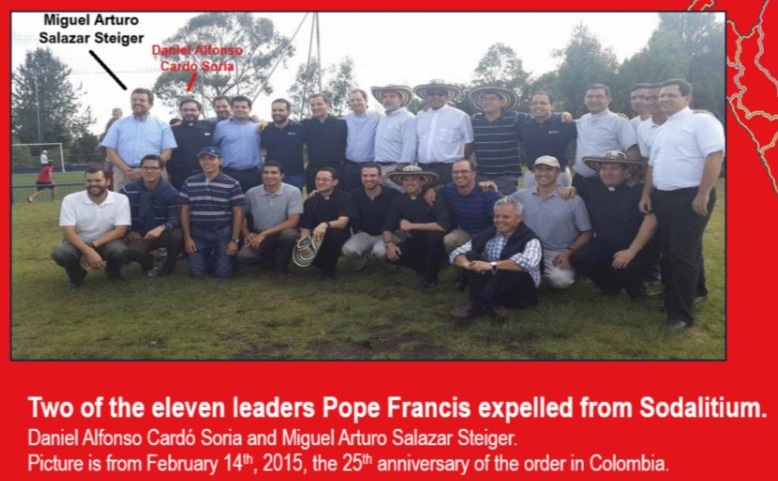
One of the constants that emerge in the ongoing series at Los Ángeles Press is that the lone predator is a fiction, a convenient lie told by the bishops to themselves, the priests, the faithful, and whoever is willing to pay attention to try to discharge their own disrespect for the victims, and their dismissive attitudes towards the potential development of actual policies to prevent abuse.
The Sodalitium is not the exception. On top of the network inside the order, they developed additional networks in the dioceses where they operate, first in Lima and Piura in Peru and then in Colombia, Chile, Brazil, Ecuador, and the United States.
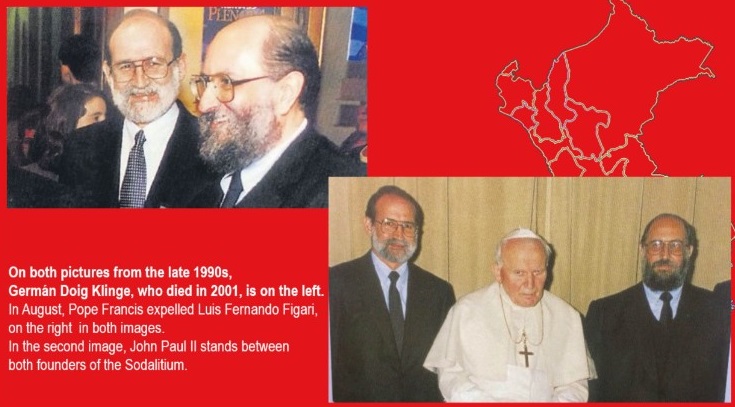
But even when Moroni Llabré tried his luck at that approach, there was enough evidence that abuse was real, that it had happened as part of the evolution of the organization led by Luis Fernando Figari and Germán Doig.
Despite that number, there are still those who, like Caccia Arana and Blanco Eguiluz claim that nothing happened.
There are others who accepted that something actually happened and decided to leave the order. That was the case of one of the two bishops that the Sodalitium was able to get in Peru, bishop emeritus of Ayaviri, Kay Martin Schmalhausen Panizo.
Back in 2018, at the height of one of the crises in the order, Schmalhausen left the order. Three years later, in 2021, he decided to resign to his diocese. Before doing that, in 2019 he offered an interview to Crux, an English-speaking Catholic medium where he foresaw the current situation at his former order, where expelling clerics from their orders amounts to no accountability for the order, for the predator cleric, for the Church at large, and even for the civil authorities.
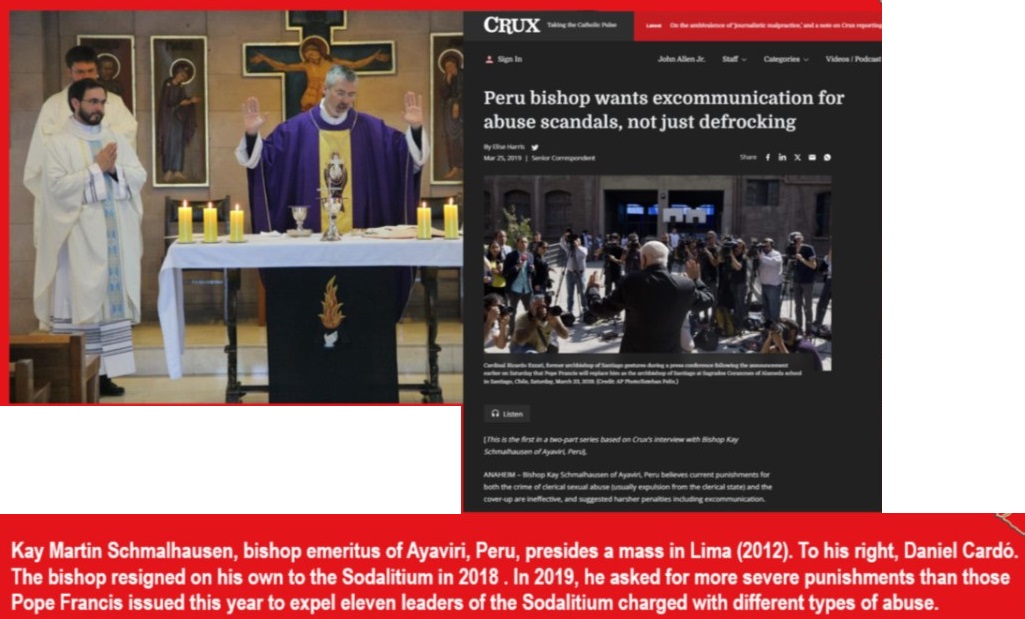
Repairing the damage
Even the most basic requirement of sacramental confession to achieve forgiveness, the reparation of the damages, is not met when the Roman Catholic Church assumes that expelling from the order or the diocese is enough.
It opens the door for the situation happening in Denver, where Daniel Cardó is guilty after a probe, but he can keep his job as pastor of the Holy Name Parish, in the Denver metropolitan area, with no hint of any consequence for that priest.
The commission set up by Moroni Llabré rejected many claims. If you read Spanish, I encourage you to read Martin Scheuch’s account of how, back in 2016-7, the commission dealt with his report.
Martin Scheuch is the brother of one of the leaders Pope Francis expelled from that organization. Erwin, a priest, was a key operative in the communications area of the Sodalitium when Eduardo Antonio Regal Villa replaced Luis Fernando Figari as Superior General.
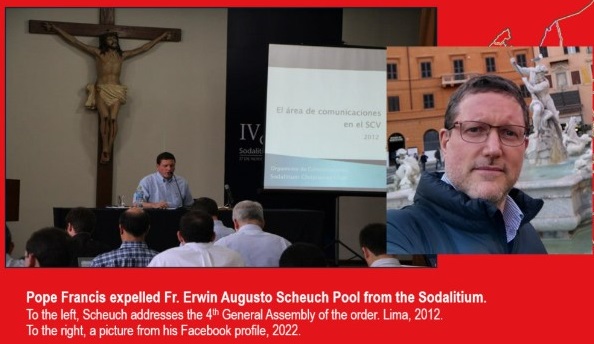
Before this paragraph there is a picture of Erwin Scheuch from his days as head of communications of the Sodalitium in Lima, dated in the Facebook account of that organization in 2012. Next, there is a more recent picture of him (2022) from his personal Facebook account.
His boss was Regal Villa. In the picture after this paragraph then Superior General of the Sodalitium salutes now emeritus archbishop of Philadelphia, Charles J. Chaput.
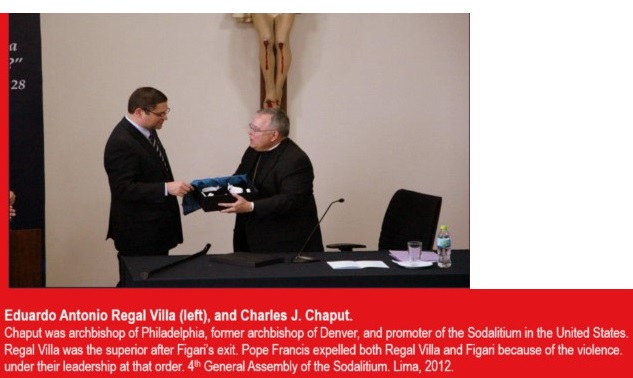
The scene happened in Lima, back in 2012, when Chaput went to Lima to participate in the Fourth General Assembly of that organization.
Chaput opened the door of the Sodalitium in Denver, where he was the archbishop from 1997 through 2011, when Pope Benedict XVI sent him to Philadelphia. It used to be that the archbishop of Philadelphia was almost certain to become, at some point, a Cardinal.
That never happened for Chaput, who is one of Francis’s fiercest critics at the United States Conference of Catholic Bishops. On top of bringing the Sodalitium to Denver, Chaput took under his wing Jorge Humberto Rodríguez-Novelo, a Mexican cleric, former member of the Legion of Christ and currently auxiliary bishop of Denver.
Rodríguez-Novelo, before becoming auxiliary bishop of Denver he spent more than 20 years in the Legion of Christ. While living in Rome he left Maciel’s order in 2004. He spent four years as priest of the diocese of Rome, and in 2008 Chaput brought him to Denver. Bishop Aquila maneuvered to make him his auxiliary back in 2016.
Other former leaders
Going back to the former leaders of the Sodalitium it is worth pay some consideration to Humberto Carlos del Castillo Drago. He is not a priest, but he has played a key role as an inhouse psychologist for the Sodalitium and for other orders in Peru.
In the next picture he appears with the members of the Order of Saint Augustine, one of the oldest orders in the Roman Catholic Church. He was with them providing some training.
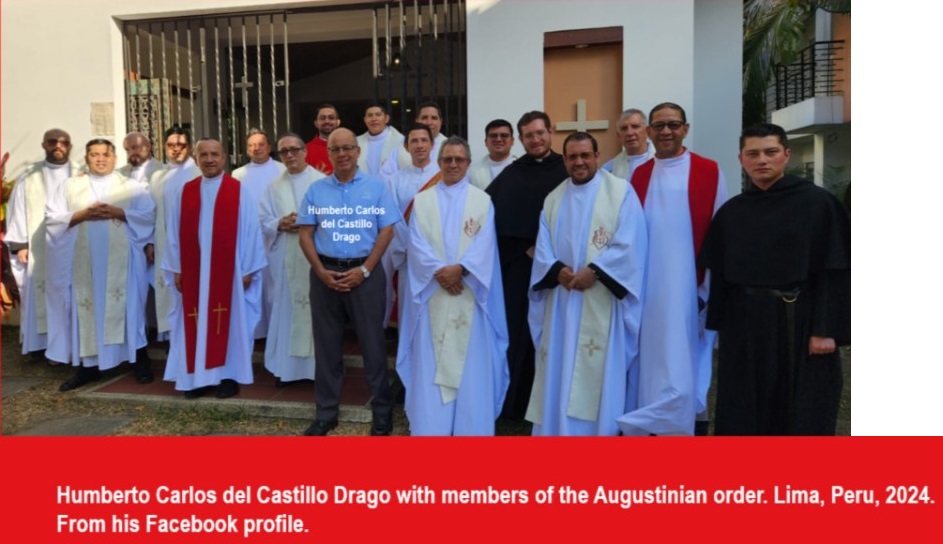
However, if one sees how he promotes himself over his Facebook account it is possible to find the kind of more specific job he does for the Sodalitium and other orders of the Roman Catholic Church in Perú.
On the first of the two cards taken from his Facebook account he appears with other two members expelled by Pope Francis from that order, non-ordained male Óscar Tokomura Tokomura and priest Rafael Ismodes Cascón.
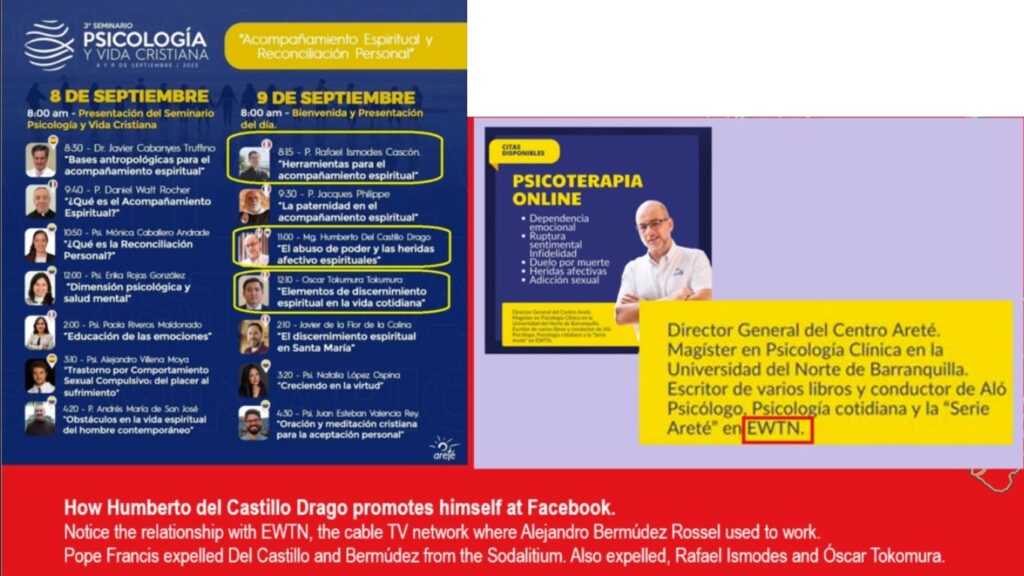
The activity happened on the 8th and 9th of this month. Ismodes—who appears in the picture with a large group in Denver, with archbishop Aquila, was talking about spiritual accompaniment; Tokomura talked about discernment, while Del Castillo Drago did it about “abuse of power and affective-spiritual wounds.”
It is noticeable how he emphasizes his relationship with EWTN, the far-right media holding that bought the Catholic News Agency and ACI Prensa from the Sodalitium a few years ago.
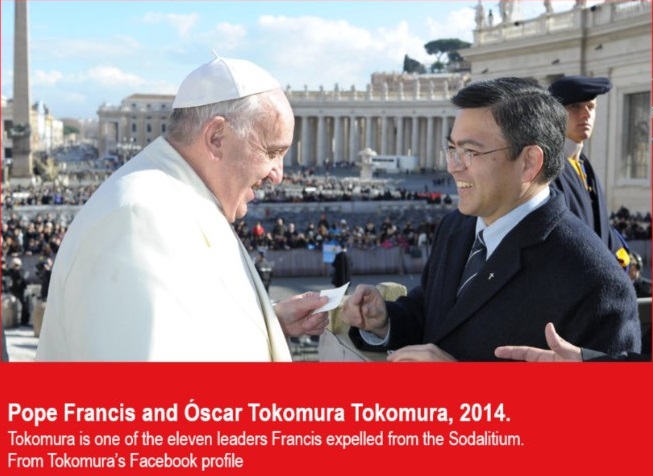
Recently he published a statement on his Facebook profile. There, even if he accepts that something wrong was happening at the Sodalitium, and he claims that he takes responsibility from his deeds, it is not clear whether or not he realizes the kind of damage he inflicted on his victims.
On the first paragraph of the second page of his statement, available as image next, he claims that the people accusing him mix facts and lies. It is unavoidable to question what he is teaching to other Roman Catholic orders in Peru when dealing with the victims of clergy sexual abuse?
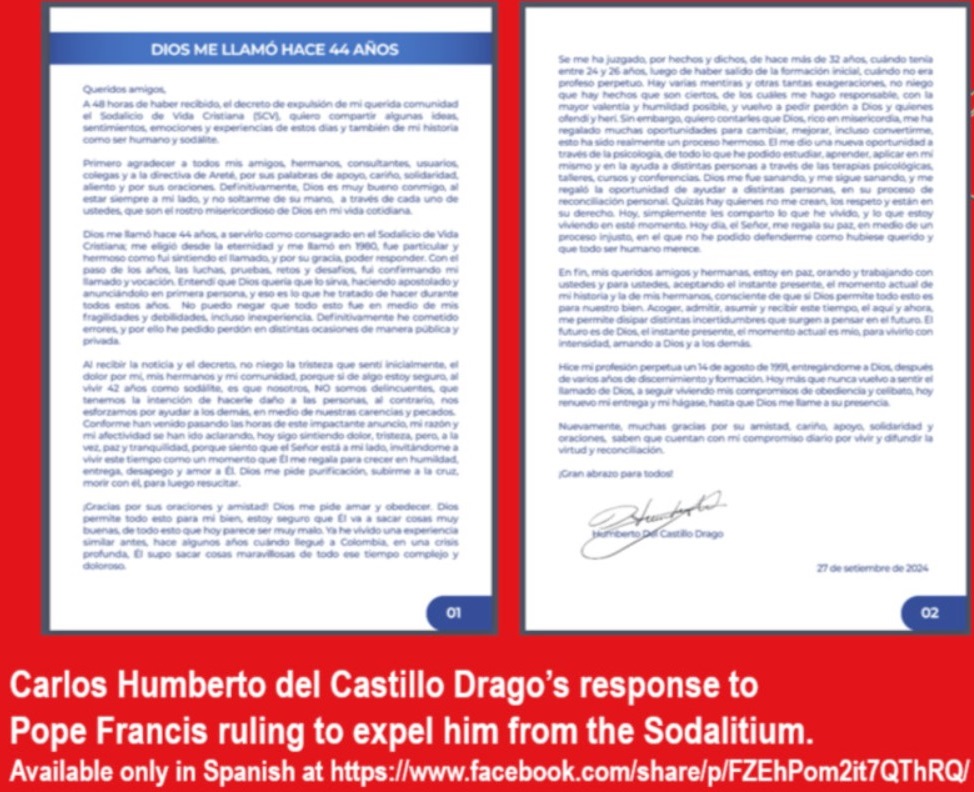
There are many potential futures for this situation. What bothers the most is the unwillingness of the political elites to address the issue of clergy sexual abuse. Even if Francis and Scicluna were fully committed to addressing this issue, at some point the civil authorities need to face their own share of responsibility. Francis only can send to jail or fine individuals holding a Vatican City passport.
Pope Francis and Archbishop Castillo address the crises
During his homily at the Cathedral in Lima, archbishop Carlos Castillo Mattasoglio used the reading from the Old Testament to stress the Sodalitium’s crux.
Archbishop Castillo emphasized in his homily how some Catholics want to believe they are “exclusive and pure, while dismissing others as impure, as second rank Catholics or Christians.” which is one of the markers of sectarian organizations as the Sodalitium, the Legion of Christ, or the Opus Dei.
He went on: “that is a lie, a lie leading the Church to a disaster, since because of that groups of privileged people emerge; people who think they own the faith as a private good while judging those facing harder and more complex situations”.
Castillo rallied the congregation attending mass with him to support Pope Francis and to criticize Caccia Arana who justifies her attitude to pretend she is a victim of abuse at the Sodalitium, because at some point in her life she attended journalism courses and EWTN gives her a space.
Castillo said in that respect: “we need to enter a deep process of renovation, but more so the Church. That is why, today when we celebrate the day of the Journalist we need to raise our voice, honestly, without subterfuges or lies when things are happening for real.”
Archbishop Castillo’s homily in Spanish is at the box after this paragraph.
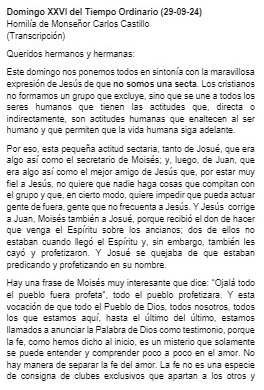
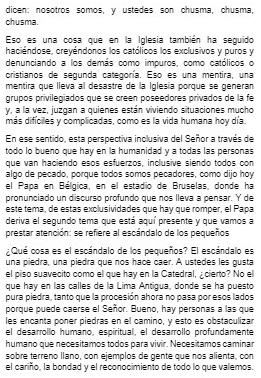
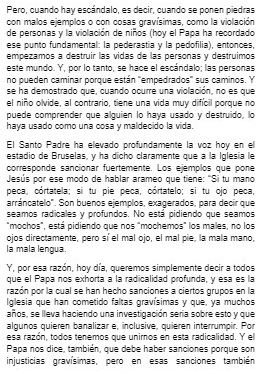
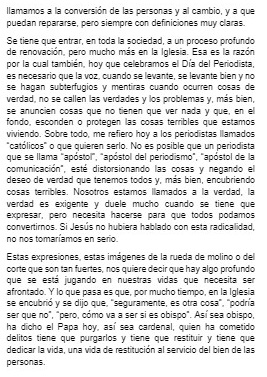
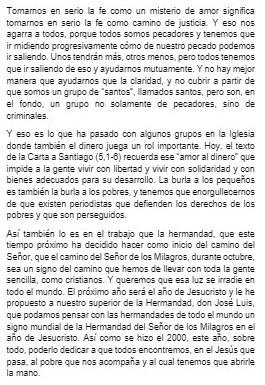
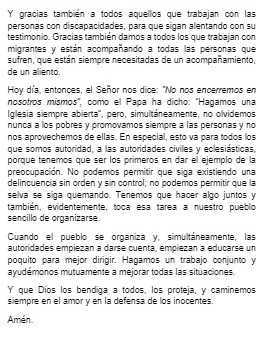
And, as the archbishop said, Pope Francis spoke in Europe.
On Friday, as part of the private agenda of his trip to Belgium he had a meeting with survivors of clergy sexual abuse.
On Sunday, during the final mass of his apostolic journey, he talked about his meeting and called explicitly to bring abuse to light:
«I heard their suffering as abuse victims, and I repeat here: in the Church, there is room for everyone, everyone, everyone, but we will all be judged, and there is no place for abuse, no place for covering up abuse.
«I ask everyone: do not cover up abuses! I ask the bishops: do not cover up abuses! Condemn the abusers and help them to heal from this disease of abuse.”
«Evil must be brought to light. Let it be known, as some abuse victims have done, and with courage. Let it be known. And let the abuser be judged. Let the abuser be judged, whether layperson, priest, or bishop: let the abuser be judged».
The Pope’s message on abuse will be posted later in English at this page, where other translations are available.
